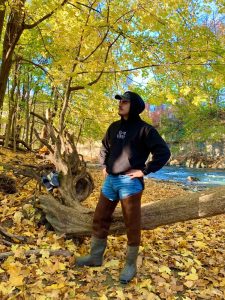From Louisiana’s Bayou to Williams College and Back: Introducing Chief Devon Parfait
Introducing Staff Spotlights! A new blog series dedicated to highlighting our talented team members who are helping advance restoration efforts for coastal Louisiana.
This week we are spotlighting Devon Parfait, Coastal Resilience Analyst for Environmental Defense Fund. Devon joined the Restore the Mississippi River Delta (MRD) family after gaining a range of experience in everything from developing media and GIS projects with the Harvard School of Engineering and Applied Sciences to conducting fieldwork on shoreline change in the Gulf Islands National Seashore with the National Park Service. We sat down with Devon to learn more about his time with the MRD so far and his world outside the office.
1.) Tell us about yourself. For example, where are you from, and what is your background?

Devon collecting suspended sediment samples by the river.
I am originally from Dulac, Louisiana, but I have moved all over Southeast Louisiana and am currently living in Marrero, Louisiana. Ever since I was 12 years old, I knew that I would eventually become the next Chief of my tribal community, the Grand Caillou/Dulac band of Biloxi Chitimacha Choctaw. Because of this, I have carved my life path to gain the necessary leadership skills and education that I would need to help with the socioeconomic issues that have plagued my people since the founding of the United States.
I have been fortunate to attend Williams College, where I graduated with a degree in Geoscience. Over the course of my four years at Williams, I used satellite imagery to quantify for the first time how tribal communities were being disproportionately affected by coastal land loss. I have also used my voice and research as a tool for advocacy and have spoken on panels, podcasts and at educational institutions. I care deeply about the environment as well as the people and living beings that live within it, and I hope to use my time on this Earth to benefit present and future generations.
2.) What is your role at Environmental Defense Fund/Restore the Mississippi River Delta, and what made you interested in pursuing it?
My official title is Coastal Resilience Analyst, but my job can be better defined as Science Coordinator, where I work to help support the science committee on various ongoing projects. I was interested in this position because it felt like the job was perfect for the experiences that I have had and what I wanted to do. Even though I studied nearly 1,500 miles away from home in Williamstown, Massachusetts, I always used my projects and studies to learn more about my home state of Louisiana.
The MRD is working to advance several goals, including restoring the coast and helping coastal communities (two things that I am passionate about). Taking this job would help to position me in a place to learn more about issues affecting coastal communities and the various organizations and state leaders working in tandem to help with the issue of land loss here in Louisiana.
3.) What about working in the coastal space intrigued you?
Coastal spaces are often on the frontlines of many complex environmental and social justice issues that are a product of the extractive systems that our society exists in. I am very passionate about helping to solve these issues and my heart is with the people affected by them. Coastal spaces are also incredibly beautiful and inspiring. They represent the convergence of two different ways of living on this planet, on land and in water, and provide a unique insight into how intimately connected and reliant we are on our natural environment.
4.) What does Louisiana’s coast mean to you?
Louisiana’s coast means everything to me. It is where I grew up; it is where I go to find my connections to my culture and identity; it is where my family lives; and it is what I love to study. I can’t imagine being anywhere else or studying anything else. I love Louisiana and all the people who live here.
5.) What advice would you give to someone who is interested in pursuing coastal issues?
Take some time to go to coastal spaces, if you can, and talk with community members to gain their perspectives. Their perspective is incredibly valuable, not only for your own intellectual engagement, but also as part of bettering the scientific process and making sure that communities are included in them.
6.) Lastly, describe yourself in one word.
Spunky
Stay connected with Devon and follow him on social media! Instagram & Twitter: @devonparfait | LinkedIn: Devon Parfait.
Stay tuned for more Staff Spotlights and learn more about our coalition by checking out our website for more about what issues America’s delta is facing, and how we are addressing them.